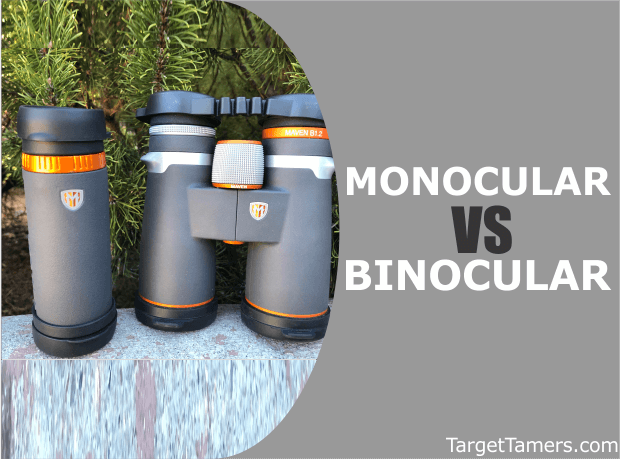
These days, nearly every hunter uses a laser rangefinder and a pair of binoculars in the hunt.
The rangefinder even serves as the monocular for many of them.
But, quickly forgotten is the monocular and how practical it can be for everyday use.
How practical?
You'll have to put it up against a pair of binoculars for a full comparison to find out! Oh wait, we just did that for you - you're welcome, and welcome to the race.
Let's get this Monocular versus Binocular match started.
Monocular Overview
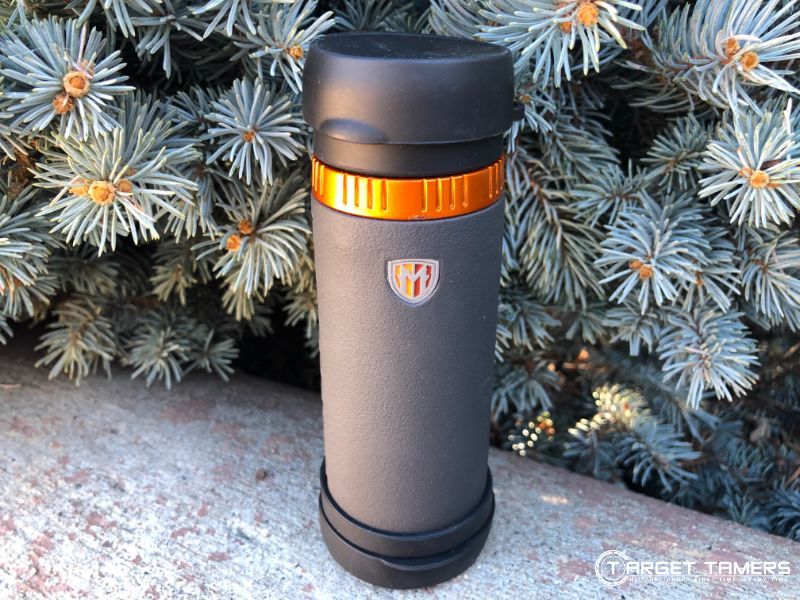
Essentially, a monocular is just one side barrel of a pair of binoculars. You could even go so far as to say that it's a mini telescope or even a tiny spotting scope. In the end, it's just a mini optic that brings long-distance images even closer with the use of one eye.
Let me introduce you. Reader, meet monocular. Monocular is a relatively low powered optic with a similar aperture to binoculars. A monocular is fast to glass with and is no longer than the length of your fist and is slimmer than your can of chew. Now that the introductions are done. Here's what you can get out of having one on your person 24/7.
Monocular Pros
- Covert to glass with (increases discretion)
- Very compact and lightweight
- Fast to use
- Provides instant use (readily available)
- Convenient to carry
- Can be worn (around the neck, in a pocket, etc)
- Can be easily hidden
- Easily observe wildlife
- Doubles as a magnifying glass
- Best use for targeted applications
- Cheaper than binoculars when it comes to quality
- Avoid getting too close to dangerous animals during observation
- Caters to users with significant variations in vision between both eyes
- Caters to users with impaired eyesight in one eye
Monocular Cons
- Faster than binoculars to experience eyestrain
- Not for tracking moving targets
- Not for wide angle viewing
- Less acute for glassing details
- Can be lower powered than binoculars
- Not comfortable to glass with for long periods of time
Monocular Bonus Features
Like all sport optics out there, manufacturers often go the extra mile to provide a high-end monocular that no other can compare to. We can call these perks "specialist features." If you want a little more from a monocular, look for:
- Zoom power
- Built-in compass
- Rangefinder
- Night vision
- Built-in image stabilizer
- Gallery scope viewing
- Folding, compact designs
Binocular Overview
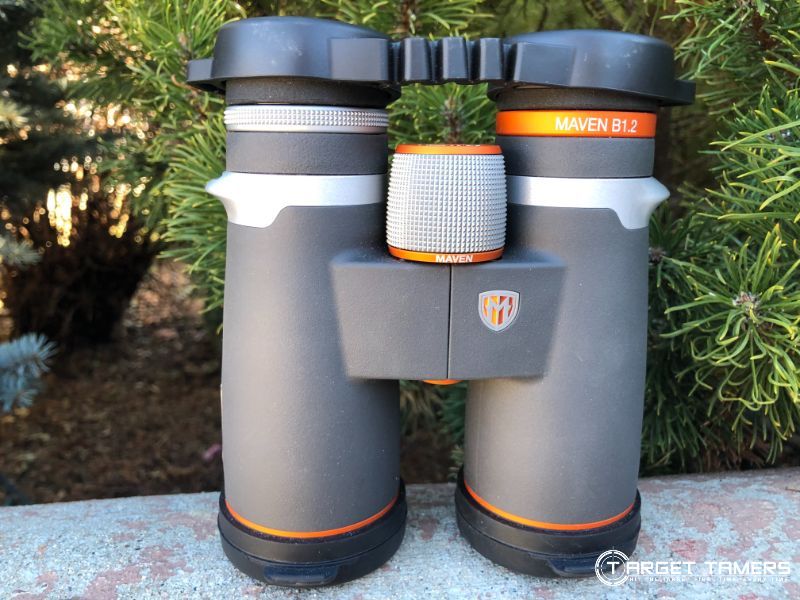
Think of it as two monoculars put together, or two mini telescopes for each eye. Since you're using both eyes to view a far-away image close up, you have a three-dimensional image which provides a lot of advantages to optic users.
Binoculars need little introduction. They're extremely popular, and there are many hunters that never leave the house without them. They can be very high-powered and high-tech devices that run into the thousands of dollars if you get all the premium features. Here's why a pair of binoculars are every bit worth the penny and ounce.
Binocular Pros
- Available in various designs
- Available in various power & aperture platforms
- Can be compact and lightweight
- Can be cost-effective
- Three-dimensional viewing
- Wide angle viewing
- Provides clear and acute glassing for details
- Track moving targets
- Can be worn (around the neck, in the pocket)
- Easily observe wildlife
- More comfortable to glass with for long periods of time
- Avoid getting too close to dangerous animals during observation
Binocular Cons
- Can be very expensive
- Not as discrete to use as a monocular
- Not as covert as a monocular
- Can be heavy and bulky
- Use in public carries stigma of spying on people
Binocular Bonus Features
As a popular sport optic, there are multiple perks that manufacturers can tack on a pair of binoculars. Even if you have impaired vision in one eye, you can still adjust an independent focus binocular to cater to various eye strengths. But, then again, this feature can be very expensive and it may be more cost effective to go with a monocular. But, let's look into what specialist features a binocular can offer.
- Independent focus
- Image stabilization
- Rangefinding
- Ballistic reticles
- Built-in inclinometers
- Long-distance ranging
Monocular VS Binoculars The Race is On!
It's time to put the Binocular versus Monocular head to head in various activity-specific situations. Whether you find yourself in the open fields, dense woods, or even at the art museum, there's always a need for an optic on hand!
Binocular VS Monocular For Hunting
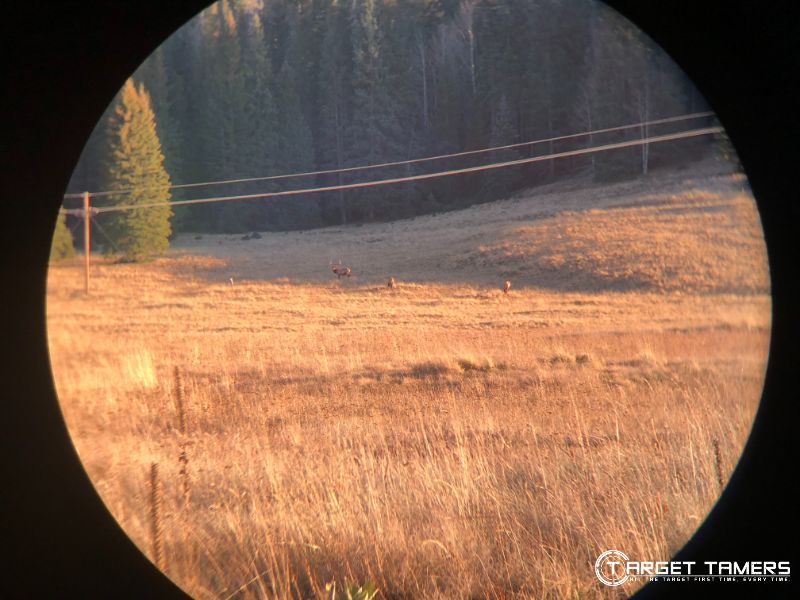
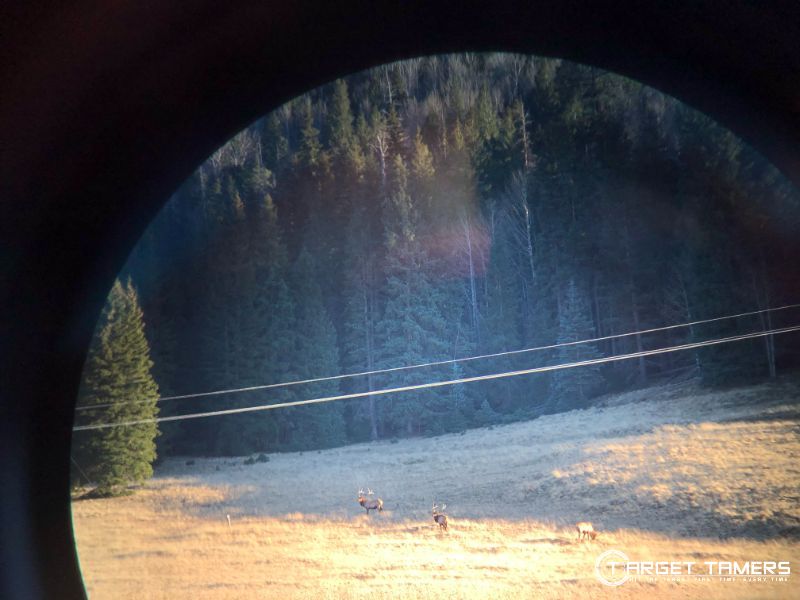
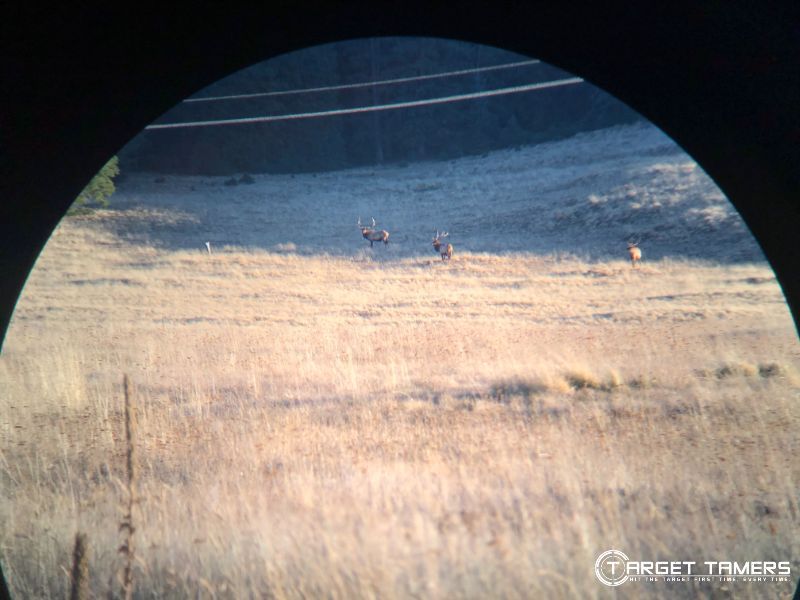
The increased depth of field and large objectives for low light conditions that you're getting from binoculars are definitely the advantages of having them in the hunt. Not only are you tracking, stalking, and watching moving targets with your binoculars, you're also needing to see acute details that a monocular might not be able to provide while you pan the area.
While a monocular is fast to pick up and use, the binoculars are faster for the eye to gather all the vital info you need when giving your target a once-over. That is, points, kill zones, gender, guesstimate distance, and any other info that specialist features can provide. The consensus is, binoculars take the trophy home today!
Winner: Binoculars
Monocular VS Hunting For Birding

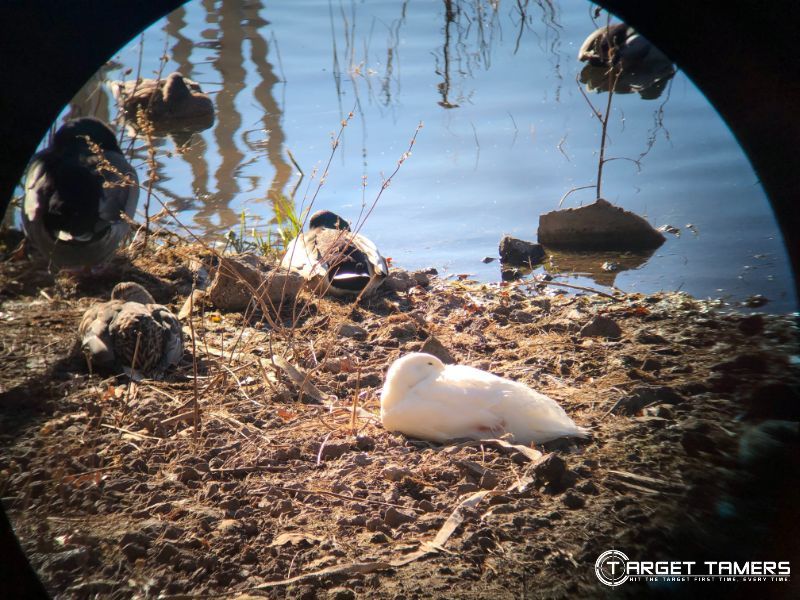
The monocular puts up fantastic competition in this arena. We all know that for serious bird watching, binoculars are always going to be the best way to go. You can glass comfortably for longer periods of time without eyestrain. You can track and scan for birds, observe as they land, peck, and take off in flight.
However, special monoculars can offer very close focus distances, and they are excellent if you need to pull them out of your pocket in an instant, especially if there's a butterfly that landed just mere feet from you. Unfortunately, they can't compare to binoculars, even compact ones, when you need two-handed steadiness.
Ultimately, it depends on if you're serious about birding and you're heading out specifically to catch some rare moments - you'll want binoculars. But, if you're walking out the door for a stroll and you're not sure if you'll catch some birds or not and want the convenience of having a compact and lightweight optic for those just-in-case moments, a monocular it is. So, what's the consensus?
Winner: Binoculars
For Hiking/Wildlife Observation
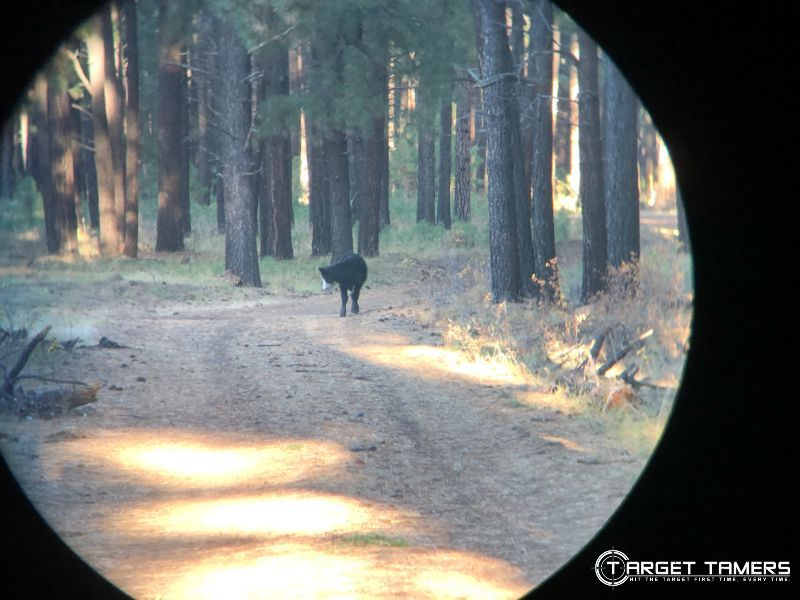
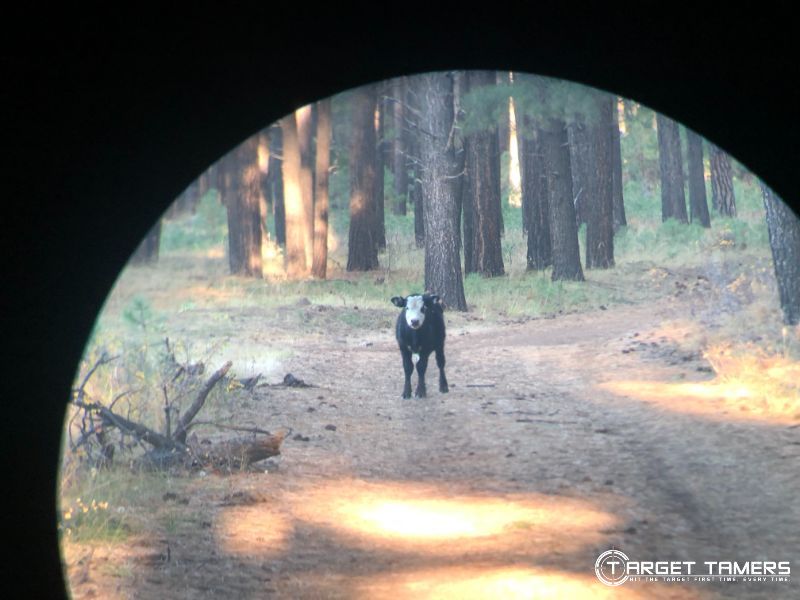
If you're absolutely fanatic about wildlife photography, you'll want a spotting scope. But, if you're out for a leisurely hike and hope to spot some wildlife while you're at it, a monocular will work just fine. They're fast to use, and it's most likely you're not so worried about deer spotting you first - you're out for a hike, right?
You won't have to worry about additional weight. Compact, folding binoculars can be very lightweight, but they can be knocked out of focus and are slower to open and align when you need them in a hurry. The point of it is, while on a hike, it's more probable that you'll see something ahead and you'll want a quick look before moving on.
Hiking can create a lot of disruption and noise, so it's very possible that wildlife will know you're coming from a mile away. Getting a quick peek from afar can be achieved with a monocular.
Winner: Monocular
For Astronomy
This activity has binoculars written all over it. In order to maximize total amount of light transmitted, astronomy binoculars have very large objective lenses in the 70-80 mm range. They'd also have to be high powered (20X plus) more-so than monoculars to achieve decent celestial viewing. Some even come with interchangeable eyepiece systems to change out magnification power.
Typically, astronomy amateurs are going to be using binoculars, mainly for their portability versus a spotting scope or full-on telescope. We're sorry to say that monoculars don't even have a chance in competing against binoculars in this arena.
Winner: Binoculars
For Night Vision/Tactical
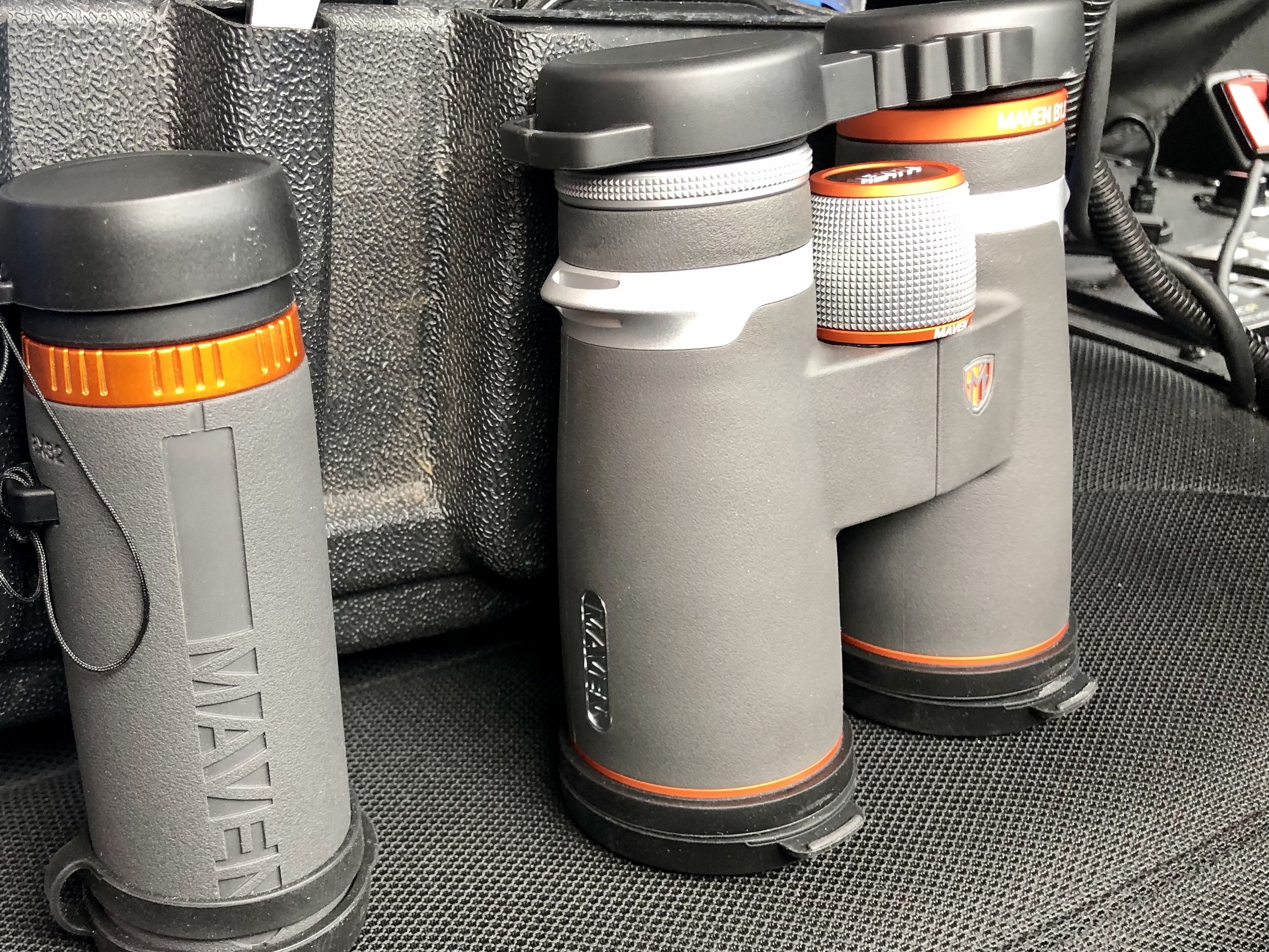
Having night vision optic capabilities can be for a variety of purposes from birding and hunting to security and tactical/military use. Because of the various activities, you'll need to look for specific features of a night vision binocular or monocular. Night vision optics will be low powered. The way that you would narrow down which is best for you would depend on your activity.
Really, if you're doing anything that requires you stalking it at night, you're obviously pretty serious about it. Hunting, birding, and serious tactical uses would require you to go with a night vision binocular. If you want something to see just beyond and around your campground, ahead of your hiking trail, or the occasional pig or coyote that visits and depletes your garden in the dead of night, a good night vision monocular is all you'll need. Being activity-specific is key to getting the right night vision optic.
Winner: Tie
For Gallery/Indoor Use
Do you find it hard to read the cryptic text on an ancient, glass-enclosed tome? How about seeing the fine fibers of a fossilized bone in a museum? It would be pretty weird and awkward to pull out a pair of binoculars, even a compact one, in a museum.
However, it wouldn't be as weird to pull out a monocular and get up close and personal with the exhibits. Many people do it. Pull out the monocular in a museum and you'll be thought of as an expert who appreciates the fine details in history. However, pulling out a monocular when you're in an open field of pre-teen deer, and you might be seen as a joke. I think we know who the clear winner is here.
Winner: Monocular
Monocular VS Binocular Stigmas
Outside of hunting, using sport optics in a public place or from your car attracts attention. Sometimes getting the scoop on local birds, insects, and animals means being in a public place like a park, square, or even a side-road parking pull-out. We've got to admit that a pair of binoculars can definitely look shady in these very public places. It can make us all wonder are they a detective? An avid birder? Or a stalker?
Monoculars definitely have the heads-up in situations like this. They're very discrete to use, and they increase your chances of covertness. They can be as slim as the size of your thumb. Their ultimate convenience is its portability and size. There's no debating these advantages.
However, binoculars are almost always the most practical optic to use for many scenarios because of its user-friendliness, ability to be versatile with many specialist features, and its deep dimensional image quality.
Why Not Both?
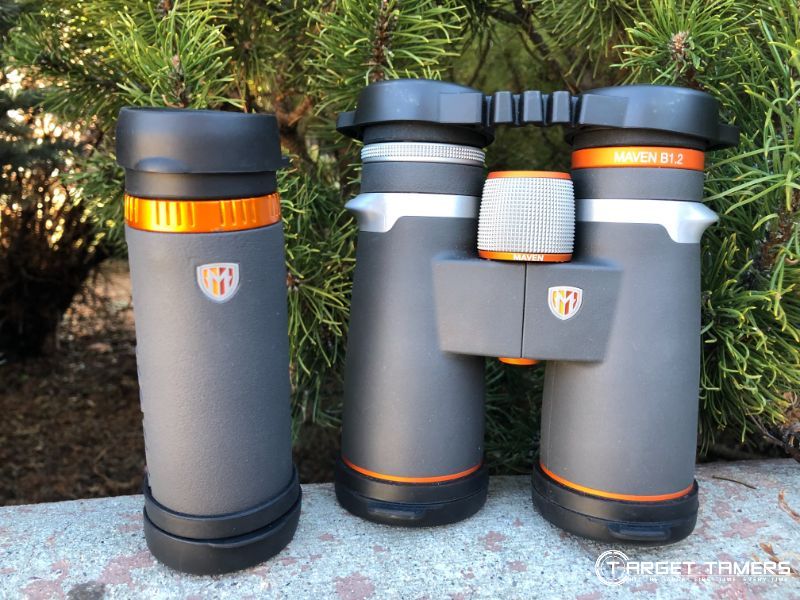
The bottom line is, be activity-specific with your optics. For recreational use, a good monocular is the most obvious buy. For specific use where detail and acuteness is required for longer periods of time, a binocular is your best buy.
A monocular doesn't replace a binocular, and a binocular doesn't replace a monocular. There's a time and place for each optic to have its 15 minutes of fame.
Further Reading




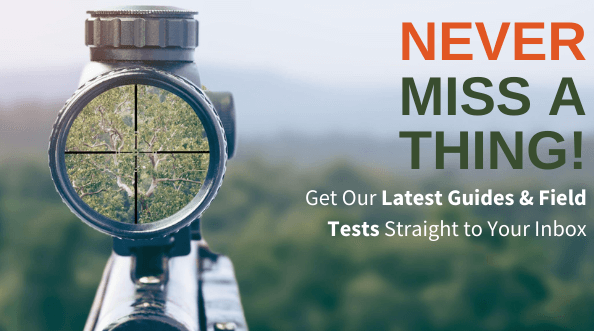
Monocular for me. I have to wear glasses, even in the bush which can be pretty annoying... I wish someone would invent little wiper blades!!
Jen Roberts
Well that would be a sight indeed!